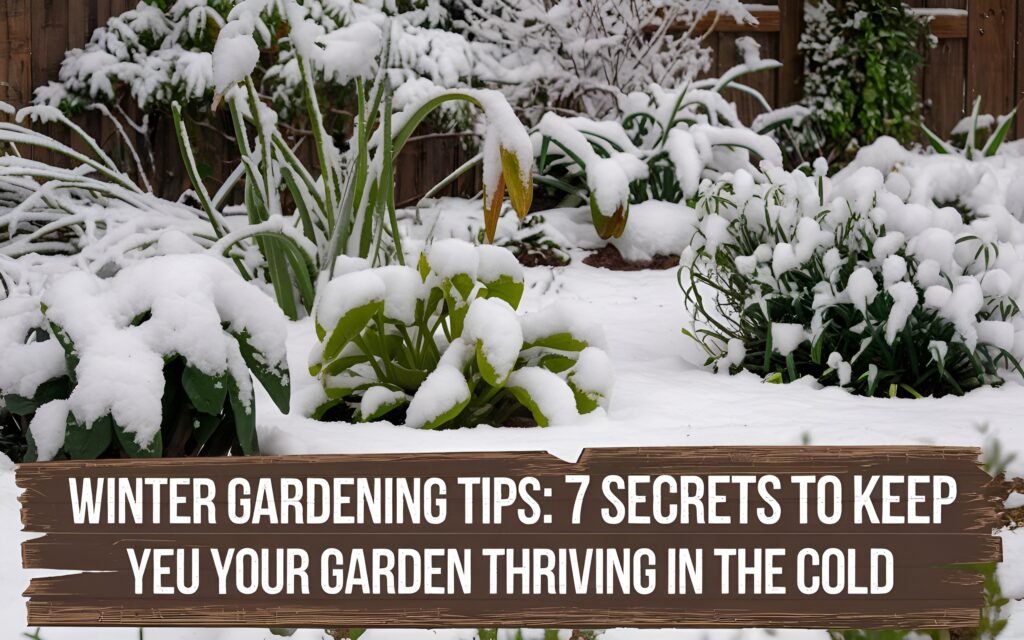Gardening is not just a hobby. With the right tips and tricks, your garden will thrive even in the coldest months. Let’s dive into how to keep your green space vibrant and green all winter long. You will learn about Winter Gardening tips.
Why Winter Gardening Is Important
The Joy of Winter Gardening
Ever wondered about the beauty of a snow-dusted landscape mixed with vibrant and green vegetation? Gardening in winter can bring a different feeling, and the sight of lush greenery in winter helps refresh anyone’s mind.
Benefits for Your Garden and Health
Gardening isn’t just a hobby or benefit; it also helps your mental and physical health. Taking care of your garden in winter can reduce a variety of stressors, improve your mood, and keep you physically active.
Understanding Your Garden’s Needs in Winter
Identifying Hardiness Zones
First things first, know your area. This will help you understand if the plants can survive the average minimum temperatures in your area. A quick online search will tell you about your area and guide your plant choices.
Microclimates: How They Affect Your Garden
Microclimates are small areas in your yard where conditions differ from the rest. It could be a bright, sunny area or a cool, shaded spot. Identifying these is essential in strategically placing your plants.

Seven Tips to Help Your Garden Succeed Even in the Cold
1. Choose the Right Plants for Winter
Not all plants can handle the cold, but many thrive in low temperatures.
- Understanding Cold-Tolerant Varieties: Look for bananas, cabbages, hellebores, or evergreen shrubs. These plants have evolved to tolerate low-temperature climates.
- Annuals vs. Perennials in Winter: Perennials are a safe bet to return year after year even after low temperatures. Additional protection or replacement may be required annually.
2. Use Mulch Wisely
For your soil, mulching serves as a warm blanket.
- Benefits of Mulching in Winter: Mulching insulates the soil, prevents temperature fluctuations and helps retain moisture.
- Types of Mulch to Use: Organic alternatives such as straw, wood chips or leaves work well. Rots to surface the soil.
3. Create Windbreaks and Shelter
Cold winds can be damaging to your plants, so consider adding protection.
- How to Build Effective Windbreaks: Better use balap skin or evergreen.
- Using Natural and Artificial Barriers: Large rocks, fences, and even temporary wooden structures help reduce wind damage.
4. Protect Your Soil
Healthy soil is the foundation of a strong garden even in winter.
- Cover Crops: An Organic Soil Protector: Plant cover crops such as clover or winter rye to prevent soil erosion and enrich the soil during spring tillage.
- Importance of Healthy Soil in Winter: Well-prepared soil retains more moisture and nutrients, ensuring plants are well-fed in the spring.
5. Watering Strategies During Cold Months
Watering can be tricky in the winter.
- Watering Schedule Tips: Water your garden on warm days so it can penetrate the soil before it freezes. The best time to water is in the early morning for cold weather gardening.
- Avoiding Frozen Pipes and Hoses: Also consider outdoor faucets to prevent unnecessary draining and damage to the hose after use.
6. Greenhouses and Cold Frames
Extend your growing season with some protective structures.
- How to Set Up a Simple Greenhouse: A small greenhouse or hook house can help maintain a warm environment for your plants.
- Cold Frames for Small Spaces: If space is limited, build or buy a cold frame. It’s like a mini greenhouse that uses the sun’s heat to keep plants warm.
7. Pruning and Plant Maintenance
Winter is a great time to beautify your garden.
- When to Prune for Maximum Growth: Prune most trees and shrubs when they are dormant, but avoid pruning until spring flowering plants have matured.
- Cleaning Up Dead or Diseased Plants: Remove dead diseased leaves promptly in the spring to prevent the spread of pests or diseases.

Common Mistakes to Avoid in Winter Gardening
- Overwatering or Underwatering: These can damage both plants. Create a balanced watering routine.
- Neglecting Frost Protection: Cover sensitive plants with cloth or move them to a shelter to protect them from frost damage.
Tips for Container Gardening in Winter
Container gardening is a perfect time to garden during the colder months.
Choosing the Right Containers
Choose containers made of durable materials such as fiberglass or all-plastic that won’t crack easily in freezing temperatures.
Insulating and Moving Containers
To keep the plants safe, pick a protected area such as a garage or covered porch.
Pest Management in the Cold Season
Insects don’t take a break during the winter either, so be careful.
Typical Winter Pests and Their Solutions
Watch out for aphids spiders that may overwinter in your garden. Use organic sprays or hand-picking to manage them.
Preventing Rodent Damage
Mice can easily get into your garden. Use protective barriers or natural repellants to keep them at bay.
How to Enjoy Your Winter Garden
Winter gardening can be a little different from other experiences.
Creating Winter Interest with Evergreens
Evergreens and all help to liven up and keep your garden beautiful. Mix plants with colorful berries or interesting rice structures.
Bird Feeders and Wildlife-Friendly Gardens
Attract birds with feeders and provide shelter for wildlife. It can add new dimensions to your garden and help the local ecosystem.

Conclusion
Winter gardening doesn’t have to be difficult. Some advance planning and care can help keep your garden enjoyable even in the coldest months. Embrace the changing of the seasons to maintain the beauty and health of your garden all year long.
FAQs
1. How can I protect delicate plants during a freeze?
Cover them with frost cloths or blankets and water the soil in advance to retain heat.
2. What’s the best mulch for winter gardening?
Organic mulches like straw, wood chips, or shredded leaves are ideal for winter.
3. Should I fertilize my garden in winter?
Generally, avoid fertilizing in winter. Hold off on encouraging growth until early spring.
4. Can I grow vegetables in the cold season?
Yes! Cold-hardy vegetables like kale, carrots, and Brussels sprouts thrive in winter conditions.
5. How do I keep pests away from my winter garden?
Regularly inspect for pests and use organic deterrents like neem oil or diatomaceous earth.




